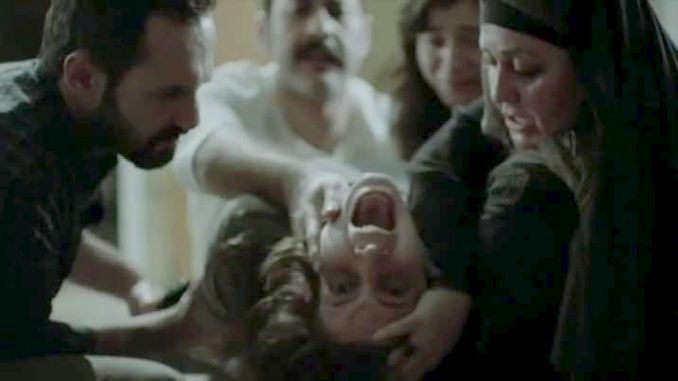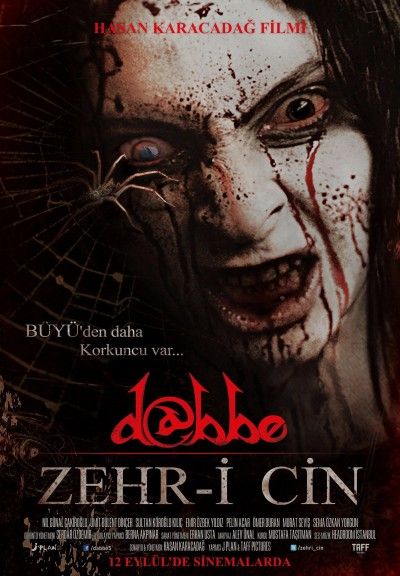
Rating: C+
Dir: Hasan Karacadag
Star: Nil Günal, Ümit Bülent Dinçer, Özbek Yildiz, Sultan Köroglu Kiliç
a.k.a. Dabbe: Zehr-i Cin
As with the fourth installment, I discovered this on Netflix just before it left. There wasn’t any other source, so I waived my usual rule about watching franchises in order. It’s not a problem since, like Siccin, this franchise largely consists standalone entries. Again, there’s a slight nod to the concept that the Internet is a demonic entity: here, in the shape of a documentary watched by a character on TV. But it’s not a major plot point: this is, by and large, a straightforward possession flick, with elements of a haunted house.
The focus is Dilek (Günal) and her husband Omer (Dinçer). She begins to hear noises and see things around their home, along with disturbing dreams. When I say, “disturbing”, I’m likely underselling them. These are full-blown, Nine Inch Nails music video on crack sequences. Initially, I found the shot on video aesthetic slightly distracting, giving it a cheap feel, like a daytime soap-opera. But it does work particularly well for the nightmares, giving them an additional hallucinatory edge. Not that they really need it. On the other hand, pushing the pedal to the metal quite so quickly, does mean Karacadag is limited in where he can go thereafter – at least visually, there isn’t another gear.
 However, the plot develops, with a friend of the family, Harun (Yildiz) knowing someone who has the rather ominous name of Belkis the Exorcist (Kiliç), and can help address the djinns targetting Dilek. Like Dabbe: The Possession, this nods at numerology, with the numbers 7730 – or maybe 7703, I forget – showing up all over the place, though it never becomes as important as it should given the earlier omnipresence. What does become significant is the opening scene, in which a woman gives birth, only for her child immediately to be snatched away for undisclosed, though almost certainly unpleasant, purposes. Turns out, this is part of a particularly nasty conspiracy, which makes Pizzagate look like Oxfam, and which is directly responsible for Dilek’s problems. Though quite why the djinns waited so long before tormenting her is not clear. Djinns gonna djinn, I guess.
However, the plot develops, with a friend of the family, Harun (Yildiz) knowing someone who has the rather ominous name of Belkis the Exorcist (Kiliç), and can help address the djinns targetting Dilek. Like Dabbe: The Possession, this nods at numerology, with the numbers 7730 – or maybe 7703, I forget – showing up all over the place, though it never becomes as important as it should given the earlier omnipresence. What does become significant is the opening scene, in which a woman gives birth, only for her child immediately to be snatched away for undisclosed, though almost certainly unpleasant, purposes. Turns out, this is part of a particularly nasty conspiracy, which makes Pizzagate look like Oxfam, and which is directly responsible for Dilek’s problems. Though quite why the djinns waited so long before tormenting her is not clear. Djinns gonna djinn, I guess.
Again. Karacadag opts for length, this one coming in at one hundred and thirty-three minutes, significantly longer than most horror films. The pacing isn’t consistent, with a few dead spots where the plot seems to be in a holding pattern. But I liked concepts like there being different families of djinn, not all of whom get along. Belkis summons a Christian djinn, to get information on how Dilek can defeat the ones on her back, which requires her to venture into their realm. It’s not a pleasant spot, and I wish the movie had spent more on this element. Instead, it feels like Dilek popped into the supermarket for a pint of milk and a ready meal. The imagery overall was enough to keep me engaged; I do feel the director might be more in love with his work than it deserves.
